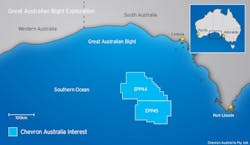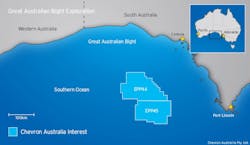Chevron abandons Great Australian Bight exploration program
Chevron Corp. has decided to abandon its $400-million (Aus.) exploration drilling program in the Great Australian Bight (GAB) off South Australia.
The company said that low oil prices are to blame and that there were more commercially attractive ventures elsewhere, such as off Western Australia. It claimed that the decision had nothing to do with government policy, regulatory, community, or environmental concerns.
Chevron is the second major to walk away from the GAB in the last 12 months. It follows BP PLC’s exit last October despite having a new $700-million rig—the Ocean Great White—ready to move to the area and begin a two-well program (OGJ Online, Oct. 11, 2016).
Interestingly, Chevron reaffirmed its plans to drill four wells in the GAB soon after BP announced its decision last year with Chevron saying at the time that it believed oil prices would recover. The company was pleased with the results of its 2-year seismic program and thought that the area had potential to produce oil and gas on a scale paralleling that of Bass Strait and the North West Shelf.
In announcing this week’s reversal, Chevron Australia’s managing director Nigel Hearne said that while the GAB is one of the country’s most prospective frontier hydrocarbon regions, in the current low oil price involvement it was not able to compete for capital in Chevron’s global portfolio.
The GAB is seen as one of the last unexplored Australian frontier basins, but work in the region was never going to be easy. Apart from the deepwater sites being subject to some of the roughest seas and wildest weather conditions in the world, making for huge exploration costs, any moves to work in the pristine marine area are fiercely contested by the environmentalists.
It remains to be seen whether the remaining block licensees in the GAB—Statoil SA, Santos Ltd., Murphy Oil Corp., and Karoon Gas Australia Ltd.—bring their current exploration plans to fruition. Norway’s Statoil, which was BP’s partner in two permits prior to the British company’s exit, still has plans at this stage to drill a well by October 2019.

